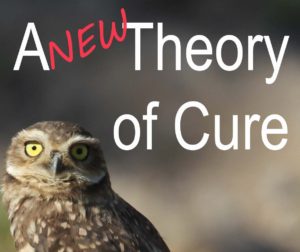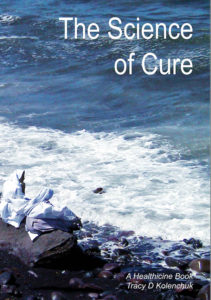Can you see the owl, hiding in the pepper tree? It’s not that hard, once you know what you’re looking for. But if you weren’t looking for an owl, it’s just a tree.
Medicine, has given up on cures, given up on the search for cures, given up on any science of cures. If medicine was a science, cures would be defined for every illness, and we would be working to find and test cures, measuring our progress towards cures, and arguing about different definitions of cures for different diseases. But there is no interest. There’s no money to be made searching for cures. Cure is not defined, even doctor’s can’t define cures.
There is no science of cures. You can, if you wish, take some time to read a few hundred of the most recent ‘medical research studies’. You’ll find few, if any, that use the word cure. Medical research studies measure symptoms. When a cure occurs, it is lumped with other results, seldom noticed.
Modern medical texts have given up on Cures
Many medical dictionaries simply do not define the word cure. Medical texts like the MERCK Manual of Diagnosis and Therapy, Lange’s Current Medical Diagnosis and Treatment, Winter Griffith’s Complete Guide to Illness, Injury, and Surgery, and Harrison’s Principles of Internal Medicine, do not use the word cure in their titles. None of them provides a definition for a cure, much less a useful, workable scientific definition. The word cure does not appear in the indexes and seldom appears on the text. Most references to ‘cure’ are inside the word ‘incurable’, or phrases like ‘does not cure’, ‘difficult to cure’, etc. These tomes recommend ‘treatments’ not cures.
Pharmaceutical Companies have given up on Cures
In of the top 20 best selling medicines in 2011, only one claims to cure any disease. In 2012, only 4 medicines in the top 100 best selling medicines claim to cure. In 2013, there are three in the top 100. USA purchases of the top 100 medicines, in 2013, was over 157 billion dollars. Less than 2 billion dollars were spend on medicines that cure. The first medicine that cure any illness was number 77 in sales.
You might think, maybe, some of those best selling medicines sold in 2013 actually cure – but we don’t notice, because cure is not defined. No. That’s not actually the case. Most, the overwhelming majority of medicines sold in 2013, are designed to decrease symptoms of illness, or to prevent illness. They make no attempt to address cause of illness, no attempt to cure. It’s getting worse, not better. The only three medicines that might cure a disease, any disease – are antibiotics. There are no other cures in the top 100 medicines sold in 2013.
And then there’s over the counter (OTC) medicines. The USA spends about 40 billion per year in OTC medicines – according to the Consumer HealthCare Products Association. We know that over the counter medicines do not cure. None of them. They treat symptoms, in many cases they treat symptoms of illnesses, like the common cold, that cannot be cured by medicines, but are easily cured by health.
Researchers have given up on Cures
In 1996 a clinical study “Homoeopathic versus placebo therapy of children with warts on the hands: a randomized, double-blind clinical trial.” tested a homeopathic medicine against a placebo, in the treatment of warts. The homeopathic medicine cured the warts in 5 patients. The placebo cured one. The homeopathic treatment cured 20% of the patients warts. The placebo cured 3.3 percent.
Two years later, in 1998, an almost identical study “A double-blind, controlled clinical trial of homeopathy and an analysis of lunar phases and postoperative outcome.” was completed. But with one, small change. The study did not measure, did not count ‘cures’. As a result, the study concluded that the homeopathic medicine performed no better than a placebo – in treating the ‘symptoms’ of warts.
Why did medicine ‘progress’, only to forget about cures?
Medical research into most, perhaps all illnesses today ignores cures. Cures are not defined as part of the research parameters. It’s hard to measure cures, so researchers measure and study symptoms instead. This leads to a predictable outcome – medicines that treat symptoms (but do not cure) cause other symptoms, calling for more medicines that treat symptoms (but do not cure). Medical researchers who believe they are working gradually ‘towards a cure’ are fooling themselves, and fooling many of us as well.
Medical Fundraisers have given up on Cures
The American Cancer Society’s mission statement, does not contain the word cure. The word ‘cure’ had almost disappeared from their website, until the recent announcement by Obama about curing cancer. Now it re-appears, but with questions like “But is it reasonable to expect we can ever ‘cure cancer,’ … In some cases, we already have.” We have cured cancer, they claim. But there is no evidence. No-one tests for cancer cures. Cure is not defined for cancer. We measure ‘5 year survival’, without symptoms of cancer, even though it takes years for a cancer to become visible. We do not measure, do not even notice cancer cures. Caner patients who are ‘cured’ disappear from the system, disappear from statistics.
The American Diabetes Association’s mission is “To prevent and cure diabetes and to improve the lives of all people affected by diabetes“, but what if someone’s diabetes was cured? How would we know? How can the American Diabetes Association search for a cure, without a definition of ‘cure’. Cure is not defined for diabetes, because to define cure requires identification of cause. But when the American Diabetes Association suggests you “Ride for the Cause”, it’s not about the causes of diabetes – it’s about their cause, to raise money – not about a search for a cause of diabetes. Note: One organization that appears to be ‘curing’ diabetes, does not use the word cure. Why not? Cure and cured are not defined for diabetes. So instead, the researchers use the word ‘reversal’. What is the difference between ‘reversing type 2 diabetes’ and ‘curing type 2 diabetes’? Cure is not defined. Neither is reversal, but no-one cares if you misuse the word reversal.
The National Obesity Foundation is dedicated to “fighting obesity, its causes and consequences”. But the word cure does not appear in their mission. Instead, they wish to “help anyone struggling with obesity to overcome this disease“. What is the difference between ‘overcoming’ obesity and curing obesity? The Obesity Medical Association claims “We are the clinical leaders in obesity medicine who work to advance the prevention, treatment, and reversal of the disease of obesity.” Why do they use the word ‘reversal’ instead of cure? If obesity is cured, would this organization continue to exist?
The Heart and Stroke Foundation has given up on cures. Their mission says “Our mission is to build healthier lives, free of cardiovascular diseases and stroke.“. A search for ‘cure’ on their site, comes up with an article titled “The quest to cure heart disease is being overshadowed by the constant pursuit of grants“. The Heart and Stroke Foundation’s main message about cure is ‘You’re the Cure‘, their campaign to build support and raise funds for their mission – which does not contain the word cure.
Cure.org, Cure.com, TheCure.com
Cure.org, you might think, is dedicated to finding cures? But no. Their website says “CURE is committed to healing for today, healing for tomorrow, and healing for eternity.” The word cure is used, but as a verb, ‘to cure’, it is ignored. Does cure.org actually cure children’s illnesses? I suspect that they do, but they don’t use the verb ‘cure’.
Cure.com sells auto insurance, with “CURE offers affordable car insurance that could save you over 50%“. TheCure.com is a rock band. That’s how much we know about cures.
Cures are Disappearing.
We don’t s earch for cures anymore. Why does this happen? Once you know you’re looking for the owl, it’s easy to see. Once you know you’re looking for a cure, is it easy to see?
earch for cures anymore. Why does this happen? Once you know you’re looking for the owl, it’s easy to see. Once you know you’re looking for a cure, is it easy to see?
There are no scientific definitions of cure and cured. There is simply no definition of cure, nor of cured for many diseases. If there is no way to recognize an owl, how can you find one?
The World Health Organization groups diseases in three broad categories:
- communicable diseases, HIV, TB, etc.
- non communicable diseases : hypertension, breast cancer, etc.
- external causes of injuries : traffic accident, drowning.
In current medical theory, communicable diseases can be cured – with antibiotics, for example and some injuries can be cured, with surgery. There are no cures, no medical definitions of ‘cured’, no tests for cured, for non communicable diseases. An entire class of diseases exists, without a single definition of ‘cured’.
When an illness cannot be cured with medicines by definition (or by lack of definition) there is no point in designing medicines to cure them. There’s no money to be made. But, there’s always money in symptoms.
Individual Cures are ignored by Medicine
If you, or your doctor, or your clinic, or your naturopath, your chiropractor, your physiotherapist, or your Traditional Chinese Medicine doctor, or your ayurvedic doctor, claims to have cured your specific illness, no one cares. Once you are cured, there is no interest. Maybe you were mis-diagnosed. Maybe you were cured. But there is nothing left to be studied. No one validates cures have been found outside of clinical studies – and clinical studies, and most clinical studies do not have ‘cure’ in their research parameters.
There are no statistics for ‘cured’. In most cases, cured is not defined such that it can be tested. Every cure is an anecdote and anecdotal evidence is easily dismissed or ignored.
Cure is well defined for antibiotics
The cause, a bacteria is known. The symptoms can be seen and measured. When the antibiotic is administered, the cause is addressed or removed, and the symptoms disappear. Healing begins – although sometimes complete healing is not possible. The patient, the illness, is cured.
The cause is key to the cure. We need the same definition for all illnesses. When the cause is addressed and the symptoms disappear the patient is cured. Healing is constantly occurring, before, during, and after the illness is cured.
Are all non communicable diseases ‘incurable’? Are hypertension, heart disease, cancer, arthritis, COPD, Chron’s, obesity, diabetes, and more diseases ‘incurable’? No. They are not incurable. They cannot be cured with medicines. Medicines cannot address their causes.
Non communicable illnesses can only be cured with health.
But, even in cases where cure is obvious, like nutrient deficiencies cured by consumption of essential nutrients, none of the medical tomes use the word ‘cure’. Scurvy is ‘treated’, not ‘cured’ – according to the medical bibles. The same occurs for every nutritional deficiency illness.
I’m not certain when the word ‘cure’ started to disappear from medical texts, but I suspect it was more than 60 years ago. The original version of MERCK’s manual had many references to ‘cure’, although most, perhaps all of those cures have been discarded today. Maybe that’s why the word cure has disappeared? Because there were so many mistakes. In the 1920s, insulin was declared the ‘cure’ for diabetes. But today, we know it is only a treatment for symptoms, one that it brings many risks and dangers in the long term.
Cures are hard. I have reviewed the 1950 edition of MERCK and found a similar lack of ‘cures’. Under scurvy, and other Vitamin deficiencies, this type of warning often appeared “Since multiple Vitamin deficiencies usually are present in such a patient, a high vitamin, high caloric diet with the use of multivitamin preparations is usually indicated.” But the word cure is not used. The 2011 edition has a weaker recommendation, and also does not use the word cure. Do we know how to cure scurvy, or not? If we do, it’s not in the book. The book does not use the word cure.
There are many illnesses that can be cured, but not by medicines.
Deficiency diseases, whether the deficiency is nutritional, or physical – like exercise, or mental – like sleep, or spiritual – like depression, or social – like social isolation, cannot be cured by medicines. They can only be cured by meeting the deficiency, by healthy actions, not medicines.
But this presents a problem defining ‘cure’ and cured. The cure for a deficiency is to meet the deficiency. But according to the US FDA “only a drug can legally make such a claim (to cure)”. This is frankly, is nonsense. If the US FDA says that only a drug can claim to cure, and no drug can cure these diseases – then there’s no point in looking for a cure. There’s lots of money to be made treating symptoms – and it’s a captive market, because there are no cures.
Illnesses caused by excess, also cannot be cured by medicines. No medicine can cure a slow, ongoing exposure to lead poisoning, or pesticides. No medicine can cure addictions or obesity. No medicine can cure excesses of the body, mind, spirit, or the community. The illnesses that result from these excesses can only be cured by restraint. But you can’t put restraint in a bottle. You can’t patent it, or sell it.
If you have arthritis, or heart disease, or a cancer, caused by a dietary or other physical excess or deficiencies, it can’t be cured with medicine. What does the science of medicine do for these diseases? It treats their symptoms without reference to cause.
Oh, there are hypothetical causes. Everything causes cancer – and everything prevents cancer. There’s lots of research that supports both sides. But when an individual gets a cancer, when a specific case of cancer arises – no-one looks for the cause.
Perhaps only alternative medicines cure? But no. Few alternative medicines claim to cure any disease, and I suspect that most that claim to cure, don’t actually cure.
Most alternative medicines simply claim to “not cure” better and safer than patent medicines “don’t cure”. Claiming to cure can be dangerous, even for alternative medicines.
Cures in the News
If you read the news, listen to the radio, or watch television, there are lots of cures. Cures are everywhere. Every day, we find new cures. But when you look closer – news reports are generally very shallow – you can’t find the cure. A few samples from today’s Google search for cure in the news:
NBCNews.com reports “Little People of Ecuador: Laron Syndrome May Unlock Cancer, Diabetes Cure”. Note, ‘may’ not cure. There is no hint that this ‘cure’ actually addresses a cause of illness. At this time, there is no cure.
Ottawa Sun reports “Canal decked in pink as hundreds skate for the cure.” But they are skating for dollars, not for cures.
The Birmingham Mail reports “Elonex Outdoor Media MD takes up Cure Leukaemia London 2 Paris challenge”. Another challenge for dollars, not for cures.
Medical Express reports “Researchers find tough new obstacle to HIV cure strategies”. eg. Not cure.
Associated Press reports “Mysterious brain disorder can be confused with Alzheimer’s, researchers work on cure”. New disease. No cure in sight. Mysterious….
BBC News reports “Ancient recipe that could be a modern cure”. A new antibiotic. The one medicine that can cure, but it can only cure infectious diseases. We need more antibiotics, because we over-use the ones we have, feeding them to livestock, creating bacteria that are immune to our poisons.
The Times of India reports “Teachers can help cure maths phobia among kids”. It’s OK to claim a cure, as long as you’re not curing a disease.
KSNT tells us that “Family looks for cure for daughter’s rare cancer”. But there are no cures to be found.
The New York Times tells us ” How the ‘Dirt Cure’ Can Make for Healthier Families”. But there is no reference to an actual cure, for an actual illness, much less any scientific study. The dirt cure doesn’t cure, it just makes you healthier. But modern medicine does not believe in ‘cures’ that come from health.
StyleCaster.com offers “10 Deeply Satisfying Peel-Off Face Masks to Cure Your Boredom (and Skin Problems)”. But boredom is not an illness, and they don’t actually cure your skin problems, because cure is not defined for ‘skin problems’.
Japan Times tells us that “Chinese scientists are working on autism cure.” How? They know a way to create autism in specific cases – and they are working to cure it after they make a money autistic. How many autistic patients might be cured? We don’t know. Maybe none, because other scientists argue that these monkeys don’t have real autism.
Eleven news reports using the word cure. Cures are everywhere. Ten of them are not actually cures. The one that might cure, is a cure for an illness we already know how to cure. We need more antibiotics because we overuse them resulting in smarter bacterial infections.
Almost all of the news about ‘cures’, is bad news. Bad news sells. Cures don’t sell.
How to Cure any Illness
We can define and test a cure for any illness. Why aren’t we doing it already?
- Define cure, based on the cause of the illness.
- Note: Some diseases can have many different causes. To cure as specific illness, it is necessary to identify the specific causes in each case.
- Address the cause of the illness.
- Test that the illness is gone, that your definition of ‘cure’ was correct.
Cures are not simple, but we can make it so. We can make simple, clear definitions of cure and cured – and then we can search for cures. And then we can refine our definitions. If we don’t know what an owl is, we will never find one – even if it flies in our face. If we don’t know what a cure is, we will never find one either.
To your health, tracy
Tracy is the author of two books about healthicine:



